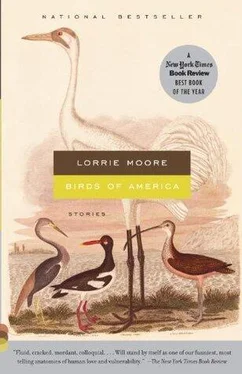Perhaps, she thinks, she is being punished: too many babysitters too early on. (“Come to Mommy! Come to Mommy-Baby-sitter!” she used to say. But it was a joke!) Her life, perhaps, bore too openly the marks and wigs of deepest drag. Her unmotherly thoughts had all been noted: the panicky hope that his nap would last longer than it did; her occasional desire to kiss him passionately on the mouth (to make out with her baby!); her ongoing complaints about the very vocabulary of motherhood, how it degraded the speaker (“Is this a poopie onesie! Yes, it’s a very poopie onesie!”). She had, moreover, on three occasions used the formula bottles as flower vases. She twice let the Baby’s ears get fudgy with wax. A few afternoons last month, at snacktime, she placed a bowl of Cheerios on the floor for him to eat, like a dog. She let him play with the Dust-buster. Just once, before he was born, she said, “Healthy? I just want the kid to be rich.” A joke, for God’s sake! After he was born she announced that her life had become a daily sequence of mind-wrecking chores, the same ones over and over again, like a novel by Mrs. Camus. Another joke! These jokes will kill you! She had told too often, and with too much enjoyment, the story of how the Baby had said “Hi” to his high chair, waved at the lake waves, shouted “Goody-goody-goody” in what seemed to be a Russian accent, pointed at his eyes and said “Ice.” And all that nonsensical baby talk: wasn’t it a stitch? “Canonical babbling,” the language experts called it. He recounted whole stories in it — totally made up, she could tell. He embroidered; he fished; he exaggerated. What a card! To friends, she spoke of his eating habits (carrots yes, tuna no). She mentioned, too much, his sidesplitting giggle. Did she have to be so boring? Did she have no consideration for others, for the intellectual demands and courtesies of human society? Would she not even attempt to be more interesting? It was a crime against the human mind not even to try.
Now her baby, for all these reasons — lack of motherly gratitude, motherly judgment, motherly proportion — will be taken away.
The room is fluorescently ablaze again. The Mother digs around in her parka pocket and comes up with a Kleenex. It is old and thin, like a mashed flower saved from a dance; she dabs it at her eyes and nose.
“The Baby won’t suffer as much as you,” says the Surgeon.
And who can contradict? Not the Baby, who in his Slavic Betty Boop voice can say only mama, dada, cheese, ice, bye-bye, outside, boogie-boogie, goody-goody, eddy-eddy , and car . (Who is Eddy? They have no idea.) This will not suffice to express his mortal suffering. Who can say what babies do with their agony and shock? Not they themselves. (Baby talk: isn’t it a stitch?) They put it all no place anyone can really see. They are like a different race, a different species: they seem not to experience pain the way we do. Yeah, that’s it: their nervous systems are not as fully formed, and they just don’t experience pain the way we do . A tune to keep one humming through the war. “You’ll get through it,” the Surgeon says.
“How?” asks the Mother. “How does one get through it?”
“You just put your head down and go,” says the Surgeon. He picks up his file folder. He is a skilled manual laborer. The tricky emotional stuff is not to his liking. The babies. The babies! What can be said to console the parents about the babies? “I’ll go phone the oncologist on duty to let him know,” he says, and leaves the room.
“Come here, sweetie,” the Mother says to the Baby, who has toddled off toward a gum wrapper on the floor. “We’ve got to put your jacket on.” She picks him up and he reaches for the light switch again. Light, dark. Peekaboo: where’s baby? Where did baby go?
At home, she leaves a message—“Urgent! Call me!”—for the Husband on his voice mail. Then she takes the Baby upstairs for his nap, rocks him in the rocker. The Baby waves good-bye to his little bears, then looks toward the window and says, “Bye-bye, outside.” He has, lately, the habit of waving good-bye to everything, and now it seems as if he senses an imminent departure, and it breaks her heart to hear him. Bye-bye! She sings low and monotonously, like a small appliance, which is how he likes it. He is drowsy, dozy, drifting off. He has grown so much in the last year, he hardly fits in her lap anymore; his limbs dangle off like a pietà. His head rolls slightly inside the crook of her arm. She can feel him falling backward into sleep, his mouth round and open like the sweetest of poppies. All the lullabies in the world, all the melodies threaded through with maternal melancholy now become for her — abandoned as a mother can be by working men and napping babies — the songs of hard, hard grief. Sitting there, bowed and bobbing, the Mother feels the entirety of her love as worry and heartbreak. A quick and irrevocable alchemy: there is no longer one unworried scrap left for happiness. “If you go,” she keens low into his soapy neck, into the ranunculus coil of his ear, “we are going with you. We are nothing without you. Without you, we are a heap of rocks. We are gravel and mold. Without you, we are two stumps, with nothing any longer in our hearts. Wherever this takes you, we are following. We will be there. Don’t be scared. We are going, too. That is that.”
“Take Notes,” says the Husband, after coming straight home from work, midafternoon, hearing the news, and saying all the words out loud— surgery, metastasis, dialysis, transplant —then collapsing in a chair in tears. “Take notes. We are going to need the money.”
“Good God,” cries the Mother. Everything inside her suddenly begins to cower and shrink, a thinning of bones. Perhaps this is a soldier’s readiness, but it has the whiff of death and defeat. It feels like a heart attack, a failure of will and courage, a power failure: a failure of everything. Her face, when she glimpses it in a mirror, is cold and bloated with shock, her eyes scarlet and shrunk. She has already started to wear sunglasses indoors, like a celebrity widow. From where will her own strength come? From some philosophy? From some frigid little philosophy? She is neither stalwart nor realistic and has trouble with basic concepts, such as the one that says events move in one direction only and do not jump up, turn around, and take themselves back.
The Husband begins too many of his sentences with “What if.” He is trying to piece everything together like a train wreck. He is trying to get the train to town.
“We’ll just take all the steps, move through all the stages. We’ll go where we have to go. We’ll hunt; we’ll find; we’ll pay what we have to pay. What if we can’t pay?”
“Sounds like shopping.”
“I cannot believe this is happening to our little boy,” he says, and starts to sob again. “Why didn’t it happen to one of us? It’s so unfair. Just last week, my doctor declared me in perfect health: the prostate of a twenty-year-old, the heart of a ten-year-old, the brain of an insect — or whatever it was he said. What a nightmare this is.”
What words can be uttered? You turn just slightly and there it is: the death of your child. It is part symbol, part devil, and in your blind spot all along, until, if you are unlucky, it is completely upon you. Then it is a fierce little country abducting you; it holds you squarely inside itself like a cellar room — the best boundaries of you are the boundaries of it. Are there windows? Sometimes aren’t there windows?
The Mother is not a shopper. She hates to shop, is generally bad at it, though she does like a good sale. She cannot stroll meaningfully through anger, denial, grief, and acceptance. She goes straight to bargaining and stays there. How much? she calls out to the ceiling, to some makeshift construction of holiness she has desperately, though not uncreatively, assembled in her mind and prayed to; a doubter, never before given to prayer, she must now reap what she has not sown; she must assemble from scratch an entire altar of worship and begging. She tries for noble abstractions, nothing too anthropomorphic, just some Higher Morality, though if this particular Highness looks something like the manager at Marshall Field’s, sucking a Frango mint, so be it. Amen. Just tell me what you want, requests the Mother. And how do you want it? More charitable acts? A billion starting now. Charitable thoughts? Harder, but of course! Of course! I’ll do the cooking, honey; I’ll pay the rent. Just tell me. Excuse me? Well, if not to you, to whom do I speak? Hello? To whom do I have to speak around here? A higher-up? A superior? Wait? I can wait. I’ve got all day. I’ve got the whole damn day.
Читать дальше












